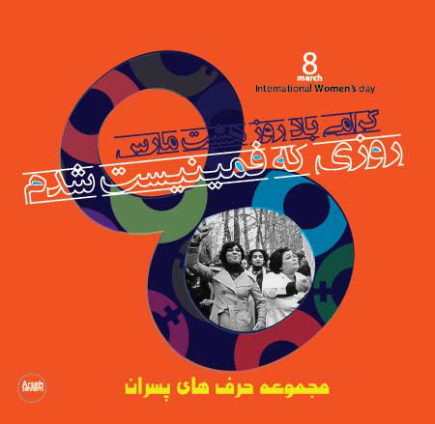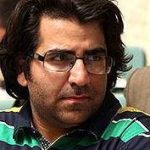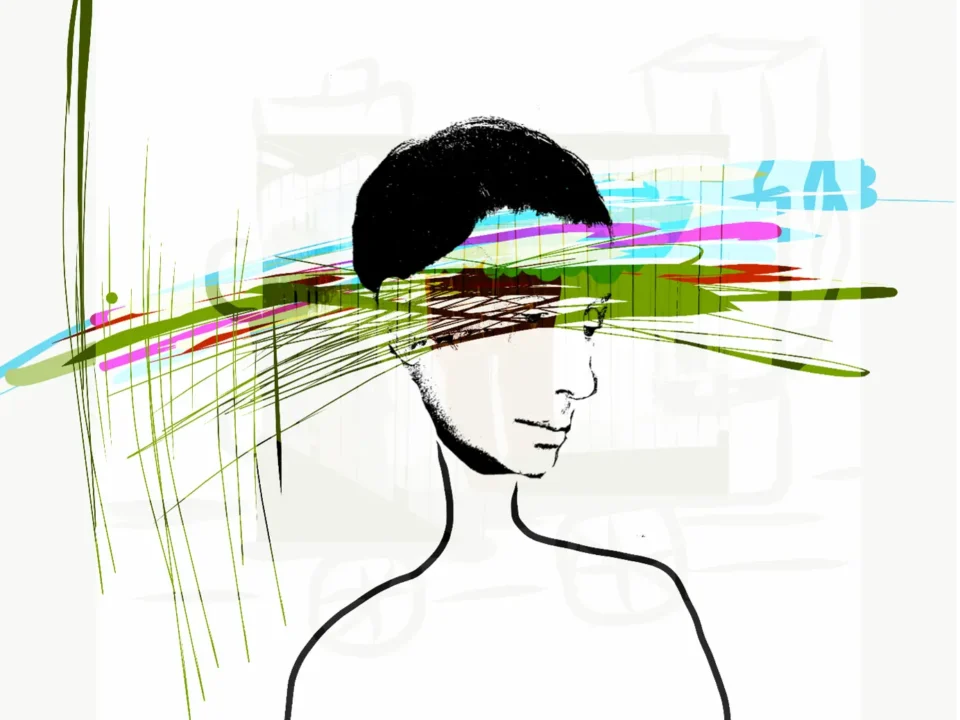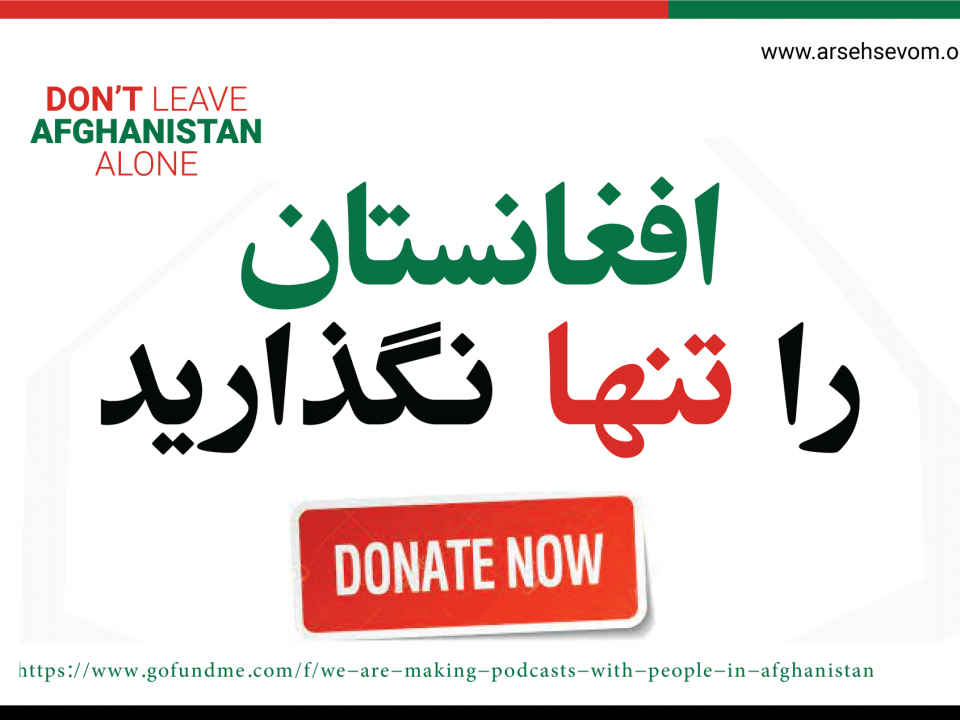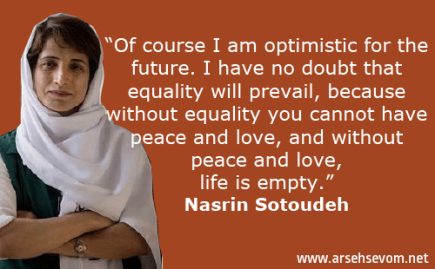
Nasrin Sotoudeh: Equality Will Prevail
March 19, 2014
Arseh Sevom Receives Prix Ars Electronica Mention
June 3, 2014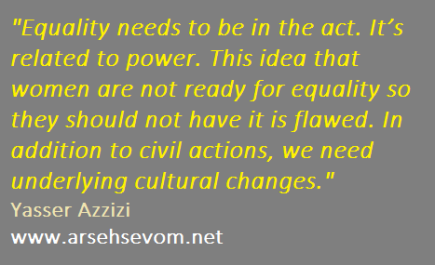 Arseh Sevom–Feminism is essentially the idea that women and men should have equal rights and opportunities. Why is it that many who care about equal rights do not identify as feminists? This is a question we often ask each other in the Arseh Sevom offices. “The notion of freedom for men is not reality in Iran as long as women are not equal” Safoura Elyasi writes. She spoke to several Iranian male activists about their relationship to feminism. One told her: “A lot of people think that women are not currently in the right situation to be treated equally, so we should not extend equality to them. Equality needs to be in the act. It’s related to power. This idea that women are not ready for equality so they should not have it is flawed. In addition to civil actions, we need underlying cultural changes.” In part one of a two part article, we hear from three different men. (Translated from the Persian)
Arseh Sevom–Feminism is essentially the idea that women and men should have equal rights and opportunities. Why is it that many who care about equal rights do not identify as feminists? This is a question we often ask each other in the Arseh Sevom offices. “The notion of freedom for men is not reality in Iran as long as women are not equal” Safoura Elyasi writes. She spoke to several Iranian male activists about their relationship to feminism. One told her: “A lot of people think that women are not currently in the right situation to be treated equally, so we should not extend equality to them. Equality needs to be in the act. It’s related to power. This idea that women are not ready for equality so they should not have it is flawed. In addition to civil actions, we need underlying cultural changes.” In part one of a two part article, we hear from three different men. (Translated from the Persian)
Activist Men Reflect on Feminism and Equality, Part I
By Safoura Elyasi
There are more young men in Iran identifying as feminists now than there were just a few years ago. Others find themselves increasingly identifying with feminist ideals. While many may not be eager for their wives to have the advantages of feminism, they want their daughters and other women to have more rights
If you view men as part of the problem, playing a role in preventing equality, then it follows that they should be part of the solution as well. We should not be surprised that many men want to be part of the movement for equality.
Just as female feminists have a variety of ideas and levels of engagement, so do feminist men. Men who support equality don’t necessarily share one idea or notion of what it means to be a feminist. They do not always agree on the problems or how they are addressed by different strains of feminism. The notion of freedom for men is not reality in Iran as long as women are not equal.
In Iran, many have accepted the traditional idea of the fundamental inequality of women. They unquestioningly agree that women are weak. A man who identifies as a feminist discovers that he is also seen as weak.
For some men, the struggle for equality is one relegated to the legal sphere. If the laws change, many men believe they will be “freed” from the mehrieh (the (financial) obligation a man has to his wife if the marriage breaks down and which can be demanded at any time during the relationship) as well as from other financial obligations. Others feel that giving women the right to travel abroad will free them from the added bureaucratic burden they face when arranging such documents. From their point of view, the rules are a problem and not the unequal cultural norms underpinning those laws.
A number of men say that they are unashamedly feminist and believe deeply in equality. Feminist men and those who believe in equality often face emasculating comments and attitudes from Iranian society –included. To be a feminist man is extremely difficult in Iranian society. This is why I chose to speak to feminist men – because they experience humiliation from the traditional society and from the women who see them as weak, as beta men who could never be appropriate husbands, boyfriends, or providers.
The notion of freedom for men is not reality in Iran as long as women are not equal.
Mahommad Shouragh
Mohammad Shouragh grew up in Ahwaz and currently resides in Tehran. He studied civil engineering and was the secretary of a student association while in university. He introduces himself as a feminist.
I was not raised in an equal family. I was raised in the patriarchy. Nearly all Iranian families are in similar situations. I grew up with a lot of newspapers and books, which allowed me an education not possible in many other families.
My father does not believe in equality, but he isn’t completely patriarchal. I am disabled and had a lot of problems with other children. Because of that, I read a lot and studied more than other children.
SE: Why are you now a feminist?
There is about 18 months difference between me and my sister. I also have two older brothers. Growing up, I realized my sister and I are about the same age, but I can do things and act in a way that is not allowed for her. I asked myself, Why? Why can’t she go to the stores or play in the streets?
When I was in high school, I found this strange. I didn’t approve of the behavior of my older brothers and the way they treated my sister. Sometimes I stood up to my brothers.
Many of the women in our family were beaten by their husbands. I saw women who had husbands with second and even third wives. I saw girls in our neighborhood who were forbidden from cutting their hair. I witnessed classmates in high school bragging about sexually harassing girls in their family.
This had a great impact on me. Most importantly, it made me wonder how can I make a better situation for my sister?
When I was in high school I participated in an 8th of March event [for International Women’s Day]. We got a magazine with texts on feminism, and I read The Second Sex. That began my education as a feminist. I spoke with people and read everything I could.
Research and data were not enough for me. I realized that I wanted to act as a feminist.
In June of 2006, The One Million Signature campaign began. I wanted to become part of the campaign and to work for them. From that time on I’ve been working with them as a feminist.
SE: How does society view feminist men?
There are two sides. On one side is patriarchal society which sees feminist men as traitors. On the other side are women who tease them and see them as weak. They say you just want to flirt, to meet women. They say you are not a man.
First they make fun of you, then they ignore you, then they fight with you.
Now our situation is better than it was five years ago. We have less of this behavior now.
There was some reasons for the negative view of feminists in general. There have been some actions taken by a number of feminists that have not been wise, that do not consider the time or place. Some take actions unrelated to feminism, yet in the name of feminism, which has caused problems for feminism in Iran.
For instance, If you want to have sex with others, it’s not important to me. If you are a feminist who is open about your sexuality, then Iranians think you want to promote free sex.
Some feminists in Iran engage in immoral behavior, saying that it is because of feminism. So if society reacts, many believe it’s because of their feminism rather than the behavior.
Yasser Azzizi
Yasser studied law. He introduces himself as a civil society and political activist sympathetic with the left. He lives in a small town near Shiraz. He has a middle class life.
The behavior of my mother and father is unsympathetic to patriarchy. A lot of people in society that we know are intellectuals behave in accordance with the patriarchy. They accept it. For example, my aunts think that there is no reason to change the laws. Their brother is the family provider and they believe they cannot be in an equal system because of their dependence on him.
My family does not think of equality as an ideology. They act according to the ideals or equality because of their situation. They deviate because of norms. Because their behavior is not ideological, they don’t act against me for my beliefs.
Many people unquestioningly accept their place in society. Because I read so much from leftist literature, I have been affected by its ideas. When you are sympathetic to the left, you must accept equality. As a result, I deeply believe in the equality of women and men.
A lot of people think that women are not currently in the right situation to be treated equally, so we should not extend equality to them. Equality needs to be in the act. It’s related to power. This idea that women are not ready for equality so they should not have it is flawed. In addition to civil actions, we need underlying cultural changes.
I began working in 2006 with the One Million Signatures Campaign. I am not a feminist. I am acting with this group because of my deep belief in equality.
SE: What does society think about feminist men?
The public ignores us. Intellectuals make sexual innuendos about us. They want to make a joke so that no one can call them out on it.
Kouhiyar Goodarzi
Kouhiyar was raised by a divorced single mother. His mother deeply believes in equality and he believes that it is his mother’s beliefs that influenced him
There is no comprehensive definition of feminism: neither in Iran nor in the rest of the world. I’ve known about feminism since childhood from reading old magazines I found that belonged to my mother and grandmother. This is where I learned about equality.
I am not a feminist, but I believe in equality, and that is what I strive for.
SE: Why do you believe in equality?
I love human rights. I am concerned about the value and generosity of humanity. I think that women’s rights are a sub-category of human rights. In this way, equality is my concern.
SE: How does society think about feminism?
Society finds it ridiculous. But with my personality and my behavior and my actions, I force people to take it seriously. Feminists view me in a very good light. Society and feminism are not looking to each other with trust. I don’t have any special experience with feminism only. I have always been acting as a human rights activist.


